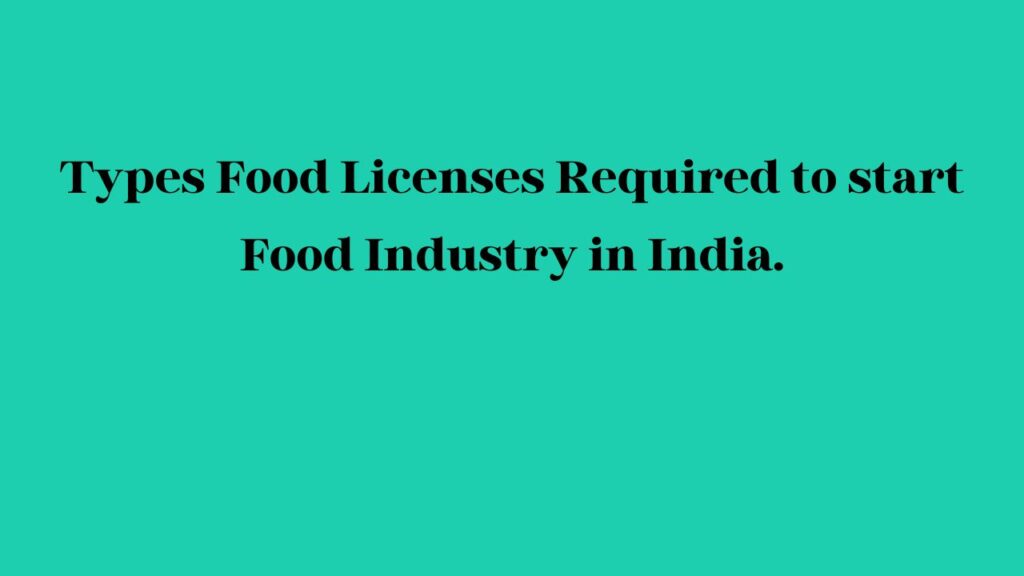Types Food Licenses Required to start Food Industry in India.

Starting a food business in India involves obtaining various licenses and registrations to ensure compliance with the country’s regulatory framework. These licenses are essential to guarantee food safety, hygiene, and quality. Below is a comprehensive list of the key types of food licenses required to start a food industry in India:
1. FSSAI Registration and License
FSSAI (Food Safety and Standards Authority of India) registration is mandatory for all food business operators (FBOs) in India. The type of FSSAI license depends on the scale and nature of the business:
- Basic FSSAI Registration: For small food businesses with an annual turnover of up to ₹12 lakhs.
- State FSSAI License: For medium-sized food businesses with an annual turnover between ₹12 lakhs and ₹20 crores.
- Central FSSAI License: For large food businesses with an annual turnover exceeding ₹20 crores or businesses involved in import/export of food products.
2. Trade License
A trade license is required from the local municipal authority to ensure that the business complies with local regulations and standards. This license ensures that the business activities are carried out in a manner that does not cause harm or nuisance to the public.
3. GST Registration
Any food business with an annual turnover exceeding ₹40 lakhs (₹20 lakhs for northeastern states) must register for GST (Goods and Services Tax). This is essential for tax compliance and for availing input tax credit.
4. Health Trade License
Issued by the municipal health department, a health trade license is necessary to ensure that the food business maintains proper hygiene and sanitation standards. This license is crucial for businesses like restaurants, food manufacturing units, and eateries.
5. Eating House License
For businesses operating restaurants, cafes, or any place where food is served to the public, an eating house license from the local police commissioner is mandatory. This license ensures that the establishment meets safety and security regulations.
6. Fire Safety Certificate
A fire safety certificate from the local fire department is essential for food businesses, especially those operating in commercial establishments. This certificate confirms that the business premises comply with fire safety norms and are equipped with necessary fire-fighting equipment.
7. NOC from Pollution Control Board
Food businesses involved in manufacturing or processing activities need to obtain a No Objection Certificate (NOC) from the State Pollution Control Board. This ensures that the business activities do not adversely impact the environment.
8. Shop and Establishment Act License
This license is required for food businesses operating as shops or commercial establishments. It regulates the working conditions, including working hours, wages, and other employment-related aspects. The license is issued by the state labor department.
9. Signage License
If your food business involves displaying signage or advertisements, a signage license from the local municipal authority is required. This ensures that the signage complies with local regulations and does not obstruct public pathways.
10. Liquor License
For restaurants or establishments that plan to serve alcoholic beverages, obtaining a liquor license from the respective state excise department is mandatory. The type of liquor license depends on the nature of the business and the types of alcoholic beverages served.
11. Import Export Code (IEC)
For food businesses involved in the import or export of food products, obtaining an Import Export Code (IEC) from the Directorate General of Foreign Trade (DGFT) is necessary. This code is essential for customs clearance and international trade.
12. Certification for Organic Food
For businesses dealing in organic food products, obtaining certification from the National Program for Organic Production (NPOP) or other accredited certification bodies is necessary. This certification ensures that the products meet organic standards.
13. BIS Certification
Certain food products require mandatory certification from the Bureau of Indian Standards (BIS) to ensure quality and safety. This includes products like packaged drinking water, milk powder, and infant foods.
14. Pest Control Certification
Ensuring a pest-free environment is critical for food businesses. Obtaining certification from a recognized pest control agency confirms that the business premises are regularly treated and maintained to prevent pest infestations.
Conclusion
Starting a food business in India involves navigating a complex landscape of licenses and registrations. Each license serves a specific purpose, ensuring that the business complies with food safety, hygiene, and quality standards. By obtaining the necessary licenses, food business operators can build a foundation of trust and credibility with consumers and regulatory authorities. At c2ex consulting, we assist businesses in understanding and acquiring the required licenses to ensure smooth and compliant operations in the food industry.

Aute mi ut suspendisse velit leo, vel risus ac. Amet dui dignissim fermentum malesuada auctor volutpat, vestibulum ipsum nulla.
Sed reprehenderit quam, non felis, erat cum a, gravida lorem a. Ultricies in pellentesque ipsum arcu ipsum ridiculus velit magna, ut a elit est. Ultricies metus arcu sed massa. Massa suspendisse lorem turpis ac.
Massa suspendisse lorem turpis ac. Pellentesque volutpat faucibus pellentesque velit in, leo odio molestie, magnis vitae condimentum.